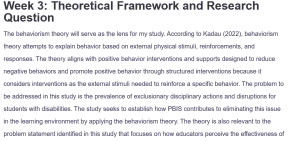Week 3: Theoretical Framework and Research Question
The behaviorism theory will serve as the lens for my study. According to Kadau (2022), behaviorism theory attempts to explain behavior based on external physical stimuli, reinforcements, and responses. The theory aligns with positive behavior interventions and supports designed to reduce negative behaviors and promote positive behavior through structured interventions because it considers interventions as the external stimuli needed to reinforce a specific behavior. The problem to be addressed in this study is the prevalence of exclusionary disciplinary actions and disruptions for students with disabilities. The study seeks to establish how PBIS contributes to eliminating this issue in the learning environment by applying the behaviorism theory. The theory is also relevant to the problem statement identified in this study that focuses on how educators perceive the effectiveness of PBIS in addressing the behavioral needs of students with disabilities, which highlights that students with disabilities are unable to learn appropriate behaviors, leading to exclusionary disciplinary actions and disruptions. This issue of exclusionary disciplinary actions and disruptions in learning environments with students with disabilities demonstrates the need for effective behavioral interventions in the learning environment.
The behaviorism theory supports the purpose of the study, which is to determine how positive behavior interventions and support can be implemented effectively to meet the behavioral needs of students with disabilities and reduce the occurrence of exclusionary disciplinary measures. The behaviorism theory is also relevant to the topic in this study because it offers a lens for understanding the application of behavioral interventions, such as positive behavior interventions, and supports in systematically promoting and modifying the behavior of students with disabilitiesThe study can explore the effectiveness of positive behavior interventions and supports in promoting positive behavioral outcomes for students with disabilities.
Research Questions
The main qualitative research question:
The sub-questions are:
- What specific strategies within PBIS do educators find most effective for SWDs?
- How do educators believe PBIS impacts the overall learning environment for SWDs?
The main quantitative research question:
- Is there a statistically significant difference in the rate of exclusionary disciplinary actions between schools with high levels of PBIS implementation and those with low levels?
Null Hypothesis: There is no significant difference in the rate of exclusionary disciplinary actions between schools with high levels of PBIS implementation and those with low levels.
Alternative Hypothesis: Schools with high levels of PBIS implementation have a significantly lower rate of exclusionary disciplinary actions compared to schools with low levels of PBIS implementation.
The research questions and hypotheses align with the behaviorism framework and purpose statement in addressing the research problem. For example, the qualitative research questions focus on gathering insight from educators, which can provide information on the practical implications of positive behavior interventions and support. Quantitative research questions focus on measuring the effectiveness of positive behavior interventions and support through observable outcomes. Therefore, the qualitative and quantitative approaches will contribute to understanding how positive behavior interventions and supports can be implemented and modified to understand the behavioral needs of students with disabilities, thus addressing the problem of exclusionary discipline practice.
References
Bal, A. (2018). Culturally responsive positive behavioral interventions and supports: A process-oriented framework for systemic transformation. Review of Education, Pedagogy, and Cultural Studies, 40(2), 144-174. https://doi.org/10.1080/10714413.2017.1417579
Kadau, I. (2022). Behaviourism theory in teaching and learning English as a second language in primary schools. International Journal of English and Literature, 13(3), 33-38. https://doi.org/10.5897/ijel2022.1511
ORDER A PLAGIARISM-FREE PAPER HERE
We’ll write everything from scratch
Question 
Week 3

Week 3: Theoretical Framework and Research Question
- Identify a framework that you believe may serve as the lens for your study. Use a theoretical framework as a PhD student.
- State your problem and purpose statements from Week 2.
- Explain how your chosen framework is relevant to your topic and problem
- Present at least one problem and framework-informed research question for both a qualitative and quantitative study
- For the qualitative research question, propose two or more sub-questions
- For the quantitative research questions, present at least one null and corresponding hypothesis. (Later, you will choose a design and make sure the design is aligned with your RQ)
- Discuss how your research questions and hypotheses align with your chosen framework and purpose statement in addressing the research problem.